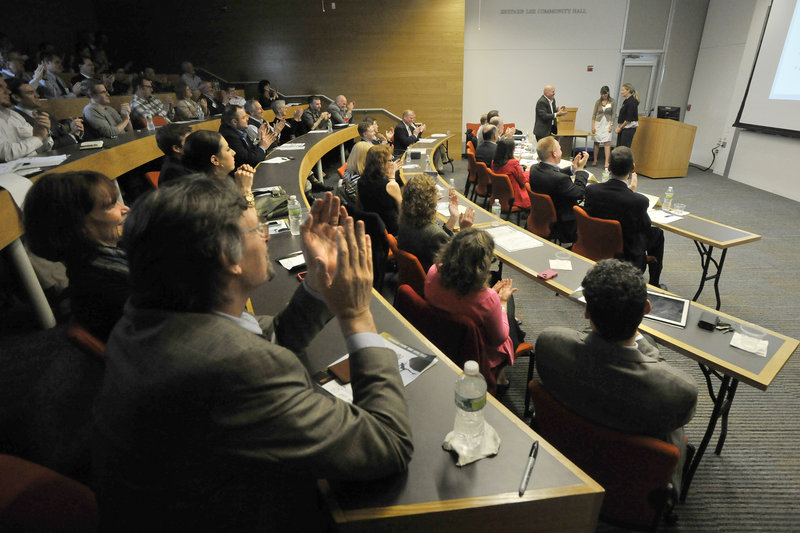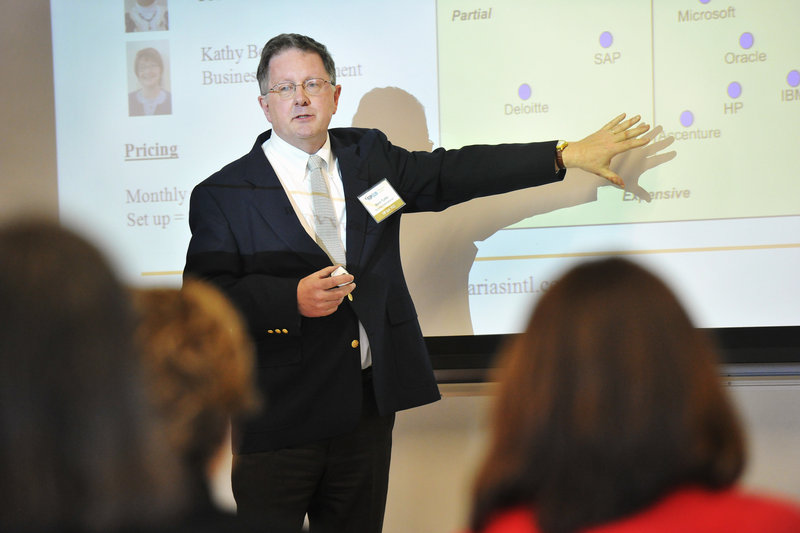PORTLAND – With Facebook’s initial public offering seen as a startup company’s dream, 13 entrepreneurial firms pitched their products Wednesday night, hoping to become the next big thing.
Upstart companies from across Maine presented their hopes, dreams and business plans to a panel of venture capitalists, business executives and professors at the University of Southern Maine’s Wishcamper Center. About 150 people attended the presentations.
Products ranged from the low-tech, such as custom shoe orthodics and elder care services, to the high-tech, such as software for architects and wind turbines for homeowners.
“Although Facebook commands all the press, it’s more important to get the doubles and the triples, not the grand slams, in business,” said Michael Kane, a panelist who is managing director of Fairbridge Venture Partners in Delaware. “There’s more job creation, more patents filed, more work being done in small and mid-sized businesses.
“I’d much rather have a slice of every company here tonight than make a big bet on who might be the next Facebook,” Kane said.
The presenters were part of the Maine Center for Entrepreneurial Development’s Top Gun program, which takes startups statewide and matches them with mentors who guide them as they develop their businesses. The companies must be interested in staying in the state.
In five-minute pitches, most companies made their case for potential funding, while others wanted business partners or help reaching prospective clients.
As in ABC’s television show “Shark Tank,” each entrepreneur made a quick business case to a panel of experts and got feedback — like speed-dating for the business world.
No money was awarded. Instead, Wednesday night’s event was more of a chance for the entrepreneurs to hone their presentation skills and get advice on how to fine-tune their pitches to potential investors.
Eventually, the companies will seek investment funds to help get their prototype products to market or help hire more workers.
The panelists said they were looking for companies that could grow, reach specific markets and fix solvable problems, as opposed to esoteric ideas with limited growth potential.
“I didn’t see a $100 billion company in the bunch, but there were companies that fill a tremendous need,” said Mike Perlmutter, a panelist who is a member of the Massachusetts-based investment firm CommonAngels. He said he has invested in 25 startup companies in New England over the past seven years.
The Top Gun program, which is in its third year, has already had some success stories. A graduate from last year’s program, Liquid Wireless of Portland, got acquired by Publishers Clearing House in January.
Perlmutter cited Beach Glass Transitions, which provides advice and support services for care of the elderly, as a company that met a market need with aging baby boomers.
“Facebook is a one-in-a-million thing. But companies like Beach Glass are doing a good social thing. It’s the best example of a marketable company,” Perlmutter said.
Beach Glass wants to market its elder care services to companies that have employees who are taking care of parents or other elderly patients.
Entrepreneurs Lynn Peel and Nova Ewers said employees are less productive at work and use more sick time when they juggle jobs with caretaking responsibilities. By offering support services, Beach Glass aims to keep employees at work and healthy, they said.
Though the Facebook IPO was cited by several presenters as the ultimate success story that changed American culture, it may be impossible or unnecessary to repeat, they said.
“Facebook is not the norm. The reality is that small and mid-sized businesses are the engine of the economy,” said Ben Polito, co-founder and president of Pika Energy, a two-year-old company based in Gorham. “You don’t have to be Facebook to have success and employ people.”
Staff Writer Jessica Hall can be contacted at 791-6316 or at:
jhall@mainetoday.com
Send questions/comments to the editors.



